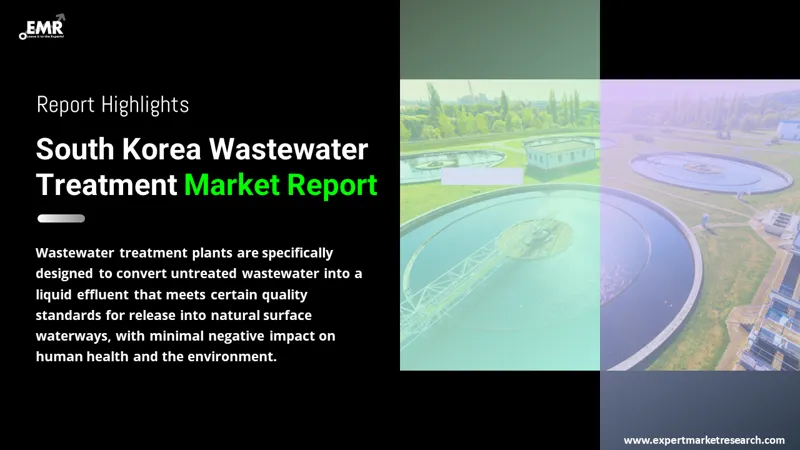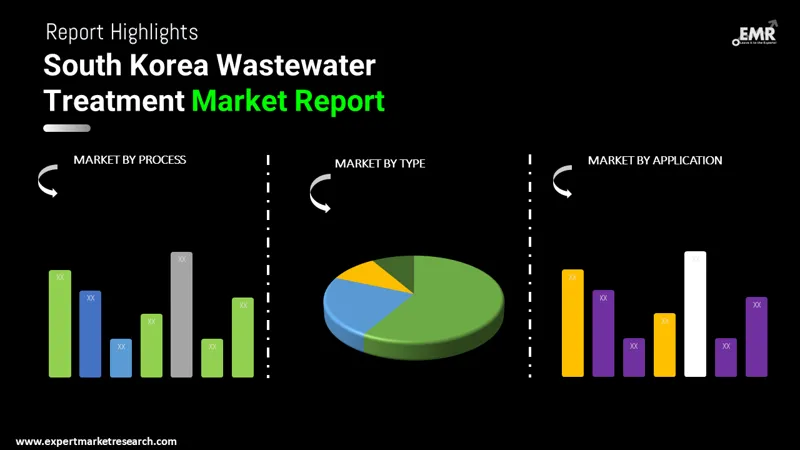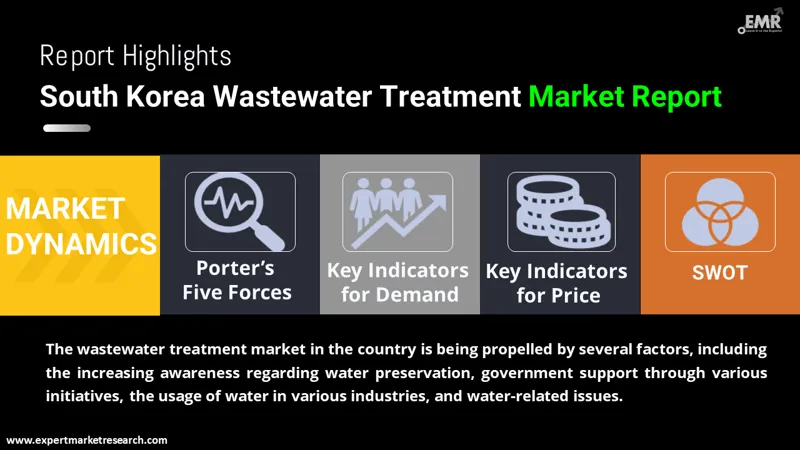
Consumer Insights
Uncover trends and behaviors shaping consumer choices today
Procurement Insights
Optimize your sourcing strategy with key market data
Industry Stats
Stay ahead with the latest trends and market analysis.
Base Year
Historical Year
Forecast Year






The South Korea wastewater treatment industry is expected to grow at a CAGR of 4.5% between 2025 and 2034. Technology and innovation, along with the government’s initiatives regarding water re-use and preservation, are the significant factors which are expected to drive the market.

Read more about this report - REQUEST FREE SAMPLE COPY IN PDF
Wastewater, in general, refers to liquid wastes produced on a daily basis as a result of production and consumption activities in homes, businesses, and industries. Wastewater treatment plants are designed to process raw wastewater into a liquid effluent of sufficient quality to be discharged into natural surface waterways while causing the least amount of harm to human health or the environment.
With the growing number of populations, the demand for water is augmenting, be it fresh or processed water. This factor is further aided by the technological advances in the country. Recently, KICT created a sewage treatment system that is sustainable in nature as it reduces the consumption of energy by approximately 60 percent. The treatment system is called the low-energy DAF system . The low-energy DAF system installed at the Ilsan Water Quality Restoration Centre in Goyang-si has the capacity to treat approximately 300 tons of wastewater using only 3.3 kW of energy per day.
Since freshwater is limited, countries, including South Korea, now rely on treating wastewater to meet the rising demands of people. Aside from sewage treatment plants, the newly designed low-energy DAF system may be utilised in a variety of facilities that require water purification, including water supply, biogas treatment, industrial wastewater treatment at the industrial level, animal manure, and will be capable of supporting the country's carbon reduction programme.
Prior to the effluent (remaining water), also known as being discharged back into our environment, the primary objective of wastewater treatment is to get rid of as many suspended particles as possible. The oxidation of solid materials depletes the oxygen needed by aquatic flora and fauna.
The basic wastewater treatment principle involves primary and secondary steps, and approximately 60% of the impurities in water are eliminated during this primary treatment. Aerating, which includes agitating the wastewater to reintroduce oxygen, is another step in this treatment. The quantity of suspended particles removed by secondary treatment is greater than 90%. The support from the government and the continuous research and invention of technologically advanced methods have helped in the development of the South Korea wastewater industry.
A 30-year drinking water dispute in North Gyeongsang Province between Daegu and Gumi was recently resolved by the environment ministry in April 2023. The citizens of both cities have been fighting over their drinking water supply ever since phenol escaped from a Gumi manufacturing area in 1991 and contaminated Daegu's drinking water through the Nakdong River's lower stream, making Daegu residents sick. Toxic chemical leaks from the Gumi Factory District into the river. In 2006, 1,4-dioxane was discovered in Daegu's tap water, followed by a dangerous perfluorinated chemical (PFC) in 2018. This dispute aided the growth of water treatment market in South Korea.
Water bodies such as rivers and the sea are habitats for many aquatic animals. Migratory birds also rely on them for food and shelter, and for us humans, apart from our basic necessities, clean water is required for various recreational activities such as boating and swimming, among others. With an increase in disposable income and a high standard of living, people spend their money on such recreational activities, which further arises the need to treat water for such purposes.
Water is used extensively in many sectors for waste product processing, cooling, and disposal. In order to address the needs of the expanding population, industrial uses require more water as industrialization progresses quickly. Wastewater production is growing quickly along with industrialisation. Since water is a basic necessity and is used in various industries, the need for its treatment to meet the ever-growing demand will further boost the growth of the wastewater market during the mentioned forecast period.
In 2018, the government of South Korea passed the act on water management and also launched a water management committee to monitor the smooth functioning as well as formulation of the action plan regarding management and water-related conflicts. The act strengthened wastewater research and development in South Korea as the Ministry of Environment increased its investment and shifted its emphasis to boosting water technology, thereby augmenting the water treatment market growth in the country.
The government handed the private sector a sizable portion of the waste management market. The government's current duties include system maintenance, reducing surplus capacity-related inefficiencies, and encouraging sustainable growth in the industry. This includes a strategy to cut the sector's electricity use by at least 50%. The government also intends to consolidate utilities based on river basins by 2030 to create economies of scale and lessen the requirement for financial assistance from the government budget. This will increase the effectiveness of investments and operations to give citizens high-quality support.
In many regions of the world, enormous volumes of wastewater are discharged into the environment untreated or with little treatment, producing environmental degradation and serious health risks for inhabitants. Diseases are spread by partially or improperly treated wastewater and untreated sewage. In this instance, it might provide a method for COVID-19 and other communicable diseases to propagate more swiftly. Moreover, many countries are facing water crises which has made water pollution and its conservation one of the major concerns to be tackled at global level. This factor offers significant growth opportunities to the wastewater treatment market players.
The market for wastewater treatment and sanitation was negatively impacted by the COVID-19 pandemic. Equipment and supplies needed for the treatment processes were scarce due to supply chain disruption during the epidemic. The lockdown scenario also resulted in a considerable reduction of industrial and commercial waste and also reduced the need for water treatment. Furthermore, the spread of the coronavirus caused a temporary slowdown in all industries around the world. However, the wastewater market is again reviving and gaining pace due to upsurging water demand.

Read more about this report - REQUEST FREE SAMPLE COPY IN PDF
Based on process, the South Korea wastewater market can be segmented into primary treatment, secondary treatment, and tertiary treatment. Based on type, the wastewater market of South Korea can be divided into membrane separation, biological, disinfection, and sludge treatment, among others. On the basis of application, the South Korea wastewater market can be classified into municipal, industrial, and agricultural.
The comprehensive EMR report provides an in-depth assessment of the market based on the Porter's five forces model along with giving a SWOT analysis. The report gives a detailed analysis of the following key players in the South Korea wastewater treatment market, covering their competitive landscape and latest developments like mergers, acquisitions, investments and expansion plans.
The wastewater goes through several treatments before being employed for use for any purpose. The first step of the process is known as the primary treatment, in which the solid contaminants are filtered out of the water. This sludge is then treated in a digester for further processing. The next step, secondary treatment, is done to further purify water. This process requires oxidation and can be done either by biofiltration, aeration, or oxidation ponds. In primary treatment, approximately 60 per cent of solid impurities are from the water, whereas in secondary treatment 90 per cent of the suspended impurities are eliminated from the water. In the final process, the tertiary step, impurities such as nitrates and phosphates are eliminated from the water. The water is further treated based on necessity and with technological developments, South Korea employs various methods to ensure safety in a sustainable manner, which has gained the trust of the Korean population to use the treated water in their daily lives, thus proliferating the wastewater market growth in South Korea.
Several purification technologies are used in South Korea for the treatment of wastewater such as membrane separation, biological, disinfection, and sludge treatment, among others. Membrane technology is one of the most preferred ways of treating wastewater for reuse. Membrane separation processes such as ultrafiltration (UF), Reverse osmosis (RO), nanofiltration (NF), and microfiltration (MF) are widely used in various wastewater treatment settings. All the segments are expected to show positive growth in the wastewater market owing to government support via numerous initiatives.
Municipal wastewater treatment is a well-established engineering field, with a variety of methods and procedures available to effectively treat wastewater. Primary sedimentation followed by secondary biological treatment employing high-rate biological processes is an effective treatment method for conventional wastewater treatment in the absence of an excessive concentration of waste from industrial sources. However, it is useless for usage in particular circumstances because of high energy prices, technological requirements, and regular maintenance issues. There is a decrease in industrial demand as a result of several significant water-using industries downscaling or curtailing activity. Lockdowns and travel restrictions have a considerable negative impact on water utility revenues owing to the fall in demand from predominant industrial and commercial customers. The South Korea wastewater market is in its revival stage and is projected to perform well during the given forecast period.

Read more about this report - REQUEST FREE SAMPLE COPY IN PDF
Krohne Messtechnik GmbH - Krohne Messtechnik GmbH produces and sells industrial process instrumentation products. The firm provides process measuring tools for sectors such as oil and gas, water, chemicals, food and drinks, mining, and shipping. Krohne Messtechnik also offers repair services to consumers. The firm was established in 1921 and is based in Duisburg, Germany.
SUEZ Group - SUEZ provides water distribution and treatment services to people, municipalities, and businesses. For municipal governments and industrial clients, the firm also provides trash collection and treatment services such as collecting, energy recovery, sorting, composting, recycling, and landfilling for non-hazardous and hazardous waste. SUEZ recycles wastewater and trash to create new resources. Asia Pacific, Europe, Africa, the United States of America, and the Middle East are among the regions where the firm operates. Suez's headquarters are located in Paris, Ile-de-France, France.
PHILOS Co., LTD - PHILOS is a research- and development-focused membrane manufacturing company that has been creating a range of membrane-related products and systems for nearly two decades. As of right now, PHILOS also develops and produces membrane bioreactors for cell culture in addition to air dehumidifiers and humidifiers for hydrogen fuel cells. Up until this point, PHILOS has mostly concentrated on MBR and UF membranes for wastewater treatment, water treatment, separation, and concentration. PHILOS and Wellspring (PHILOS' sister firm) both manufacture research and development equipment, namely in the area of membrane production and assessment. The firm was established in 2002 and has its headquartered in Seoul, South Korea.
| REPORT FEATURES | DETAILS |
| Base Year | 2023 |
| Historical Period | 2018-2024 |
| Forecast Period | 2025-2034 |
| Scope of the Report |
Historical and Forecast Trends, Industry Drivers and Constraints, Historical and Forecast Market Analysis by Segment:
|
| Breakup by Process |
|
| Breakup by Type |
|
| Breakup by Application |
|
| Market Dynamics |
|
| Competitive Landscape |
|
| Companies Covered |
|
*While we strive to always give you current and accurate information, the numbers depicted on the website are indicative and may differ from the actual numbers in the main report. At Expert Market Research, we aim to bring you the latest insights and trends in the market. Using our analyses and forecasts, stakeholders can understand the market dynamics, navigate challenges, and capitalize on opportunities to make data-driven strategic decisions.*
Get in touch with us for a customized solution tailored to your unique requirements and save upto 35%!
The market is projected to grow at a CAGR of 4.5% between 2025 and 2034.
The growing Awareness Regarding Water Preservation, the government’s support via several initiatives, the usage of water in various industries, and water-related issues in the country further propel the wastewater treatment market in the country.
New technologies and innovations are the leading trends in the market.
The dominant types of wastewater treatment in the industry are membrane separation, biological, disinfection, and sludge treatment, among others.
The major players in the South Korea wastewater treatment industry are TSK Water Co., LTD., BKT CO., LTD., Hansu Co., Ltd. (Kurita), Veolia Environnement, SUEZ Group, Krohne Messtechnik GmbH, YUCHON ENVIRO CO., LTD., PHILOS Co.,Ltd., and KOReD Co.LTD, among others.
Single User License
One User
USD 3,999
USD 3,599
tax inclusive*
Datasheet
One User
USD 2,499
USD 2,249
tax inclusive*
Five User License
Five User
USD 4,999
USD 4,249
tax inclusive*
Corporate License
Unlimited Users
USD 5,999
USD 5,099
tax inclusive*
*Please note that the prices mentioned below are starting prices for each bundle type. Kindly contact our team for further details.*
Flash Bundle
Small Business Bundle
Growth Bundle
Enterprise Bundle
*Please note that the prices mentioned below are starting prices for each bundle type. Kindly contact our team for further details.*
Flash Bundle
Number of Reports: 3
20%
tax inclusive*
Small Business Bundle
Number of Reports: 5
25%
tax inclusive*
Growth Bundle
Number of Reports: 8
30%
tax inclusive*
Enterprise Bundle
Number of Reports: 10
35%
tax inclusive*
How To Order
Our step-by-step guide will help you select, purchase, and access your reports swiftly, ensuring you get the information that drives your decisions, right when you need it.

Select License Type
Choose the right license for your needs and access rights.

Click on ‘Buy Now’
Add the report to your cart with one click and proceed to register.

Select Mode of Payment
Choose a payment option for a secure checkout. You will be redirected accordingly.
Gain insights to stay ahead and seize opportunities.

Get insights & trends for a competitive edge.

Track prices with detailed trend reports.

Analyse trade data for supply chain insights.

Leverage cost reports for smart savings

Enhance supply chain with partnerships.

Connect For More Information
Our expert team of analysts will offer full support and resolve any queries regarding the report, before and after the purchase.
Our expert team of analysts will offer full support and resolve any queries regarding the report, before and after the purchase.
We employ meticulous research methods, blending advanced analytics and expert insights to deliver accurate, actionable industry intelligence, staying ahead of competitors.
Our skilled analysts offer unparalleled competitive advantage with detailed insights on current and emerging markets, ensuring your strategic edge.
We offer an in-depth yet simplified presentation of industry insights and analysis to meet your specific requirements effectively.



Australia
63 Fiona Drive, Tamworth, NSW
+61-448-061-727
India
C130 Sector 2 Noida, Uttar Pradesh 201301
+91-723-689-1189
Philippines
40th Floor, PBCom Tower, 6795 Ayala Avenue Cor V.A Rufino St. Makati City,1226.
+63-287-899-028, +63-967-048-3306
United Kingdom
6 Gardner Place, Becketts Close, Feltham TW14 0BX, Greater London
+44-753-713-2163
United States
30 North Gould Street, Sheridan, WY 82801
+1-415-325-5166
Vietnam
193/26/4 St.no.6, Ward Binh Hung Hoa, Binh Tan District, Ho Chi Minh City
+84-865-399-124
United States (Head Office)
30 North Gould Street, Sheridan, WY 82801
+1-415-325-5166
Australia
63 Fiona Drive, Tamworth, NSW
+61-448-061-727
India
C130 Sector 2 Noida, Uttar Pradesh 201301
+91-723-689-1189
Philippines
40th Floor, PBCom Tower, 6795 Ayala Avenue Cor V.A Rufino St. Makati City, 1226.
+63-287-899-028, +63-967-048-3306
United Kingdom
6 Gardner Place, Becketts Close, Feltham TW14 0BX, Greater London
+44-753-713-2163
Vietnam
193/26/4 St.no.6, Ward Binh Hung Hoa, Binh Tan District, Ho Chi Minh City
+84-865-399-124
Share